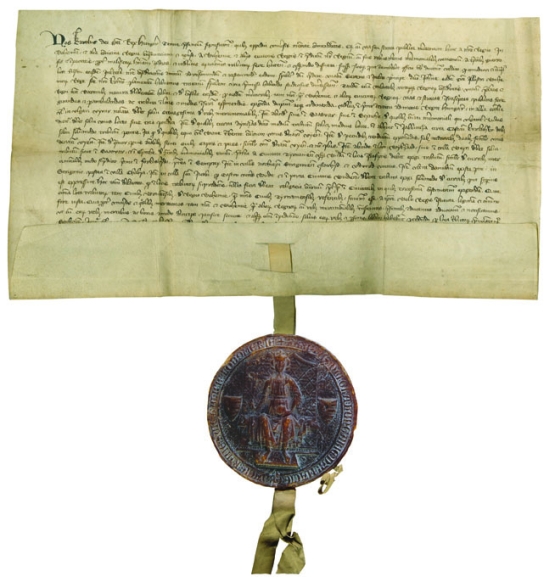The document of Charles, King of Hungary, on assuring the merchant road to Bohemia, and on fixing tolls paid by them
We, Charles, by divine grace King of Hungary, announce to all through the present document that the public road of merchants that traversed from our kingdom to Bohemia and to other neighbouring countries, and vice versa from Bohemia and from other distant countries to our kingdom, by which with goods and articles merchants do arrive, has been since the time of war and turbulence deserted as a direct consequence of the fraudulence of malefactors and illegal tolls imposed until the present times; we - due to our honour entrusted by God - expending care on its restoration for a more comfortable and tranquil way, first formed a council with the magnificent sovereign Lord John, by the same divine grace King of Bohemia, our beloved kinsman, and held a discussion on these affairs. Then, considering the advantages to both kingdoms, we held a council with our prelates and barons. We reached the decision that both our merchants and those of Bohemia and of distant countries are obligated to travel on the public roads mentioned below, and to pay tolls in the places and by the methods mentioned below. First, when entering into the borders of Hungary an eightieth of the merchant goods shall be paid at White Church (Alba Ecclesia), commonly called Wywar (Holíč); item, at Saaswar (Šaštín) or at Scynche (Senic) for each merchant coach, commonly called 'rudas', one loctus (i.e. one sixteenth of a marca), or three ponderus ought to be paid; item, of each coach called 'aynczas' a half toll, so a half loctus (one and one half ponderus); then from here only at Jabluncza (Jablonica) around the castle Kurlathkw (Korlátov Kameň) ought to be paid a bridge-toll, that is, of each coach-pulling horse or oxen one denarius of Vienna; item, for two large domestic animals to be sold one denarius of Vienna, for four smaller domestic animals, such as sheep, goat, pig, one denarius of Vienna. Item, at the place of Bykzaad (Buková) or in the village of Beyn (Bíňovce) the same amount must be paid for the merchant coach as in Saaswar (Šaštín) and Scynche (Senic); item, from the town of Tyrnavia (Trnava) to Buda in the following places there ought to be paid tolls on merchant coaches in the aforementioned way; first at Forkoshyda (Vlčkovce), then at Semptey (Šintava), then in the Archiepiscopal villages of Narhid (Nové Zámky) and Wdword (Dvory); item, in the Transdanubium in Strigonio (Esztergom), then in the village of Chabya (Piliscsaba); item, in the village of St. Jakob (region of Budapest) before the castle of Old Buda (region of Budapest); item, at the gate of the town of Buda, here the toll must be paid in the above-written way only for the coaches. We also declare that in the aforementioned toll-places coaches cannot be stopped except at those towns where the thirtieth ought to be paid. We know from the reports of both the burgers of the town of Brno and those of our town of Tyrnavia (Trnava) that these toll-places have been lawful, legal, and valid since the time of King Bela. Therefore we, through the present document, call all merchants, ours, those of Bohemia or of different countries, and announce that now and in the future they can pass in security - referring to their goods, as to their persons - and free from obstacles at the abovementioned toll-places with all their articles, values, and goods. Consequently, we issue orders by our royal decree to master Stephan, son of Lack, Castellan of Wywar (Holíč), of Berench (Branč), of Bolundoch (Beckov); item, to master Nicholas called Treutul comes Posoniensis (Bratislava), Castellan of Kurlathkw (Korlátov Kameň) and Hedrich (Ostrý Kameň); item, to master Lawrence Slavic, Castellan of Semptey (Šintava), to all who serve in these offices, and to those who shall charge them in the future, and similarly to those who usually entreat the Archbishop of Strigonia (Esztergom), the prelates, the noblemen and different honoured men, who maintain and watch any of these toll-places, by our present document we order that they are obligated - considering our grace - to maintain the aforementioned merchant roads freely, and free from obstacles, in security and peace; moreover, they cannot molest or disturb the merchants and cannot overcharge or make them pay above the fixed tolls, otherwise they shall commit a grave offence against our Majesty. We command that all this action completely and partially be proclaimed at fairs, and in public places. Concluded at Visegrád, on the day of Epiphany, in the year of the Lord 1336.
 Charter issued on January 6, 1336, with the seal of Charles of Anjou
Charter issued on January 6, 1336, with the seal of Charles of Anjou (Original: Brno City Archive)
"6 January 1336". In: Rácz, György (ed.): Visegrád 1335. Bratislava, 2009, pp. 167-168.
 Charter issued on January 6, 1336, with the seal of Charles of Anjou (Original: Brno City Archive)
Charter issued on January 6, 1336, with the seal of Charles of Anjou (Original: Brno City Archive)